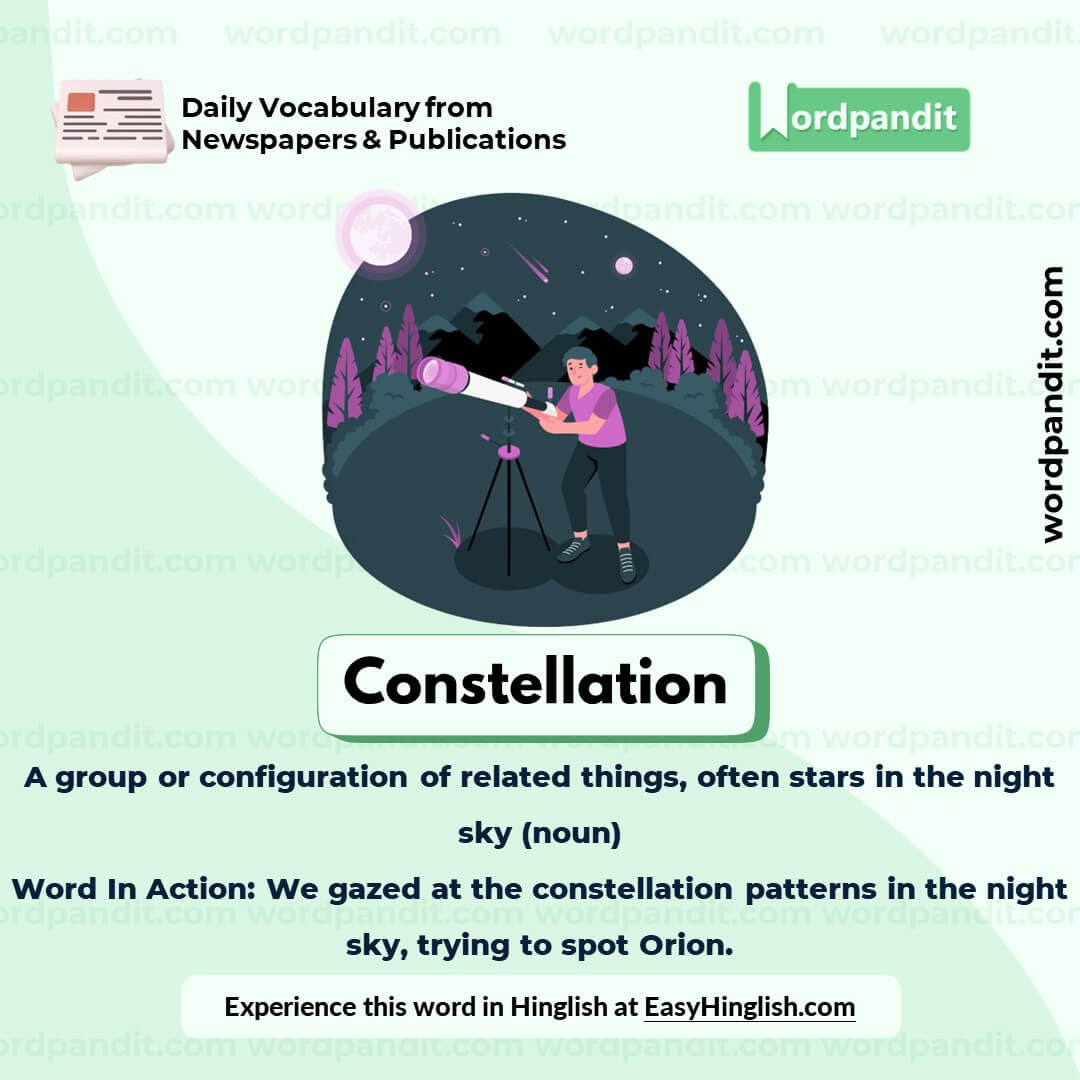Daily Vocabulary from Indian Newspapers and Publications
Welcome to Wordpandit’s Indian Vocabulary Hub
At Wordpandit, we understand the importance of staying rooted in the local context while expanding your language skills. This section focuses on enriching your vocabulary with words and phrases drawn from India’s leading newspapers and publications, ensuring you're learning vocabulary that is practical, relevant, and uniquely Indian.
Why Indian Sources Matter
We believe that the best way to master any language is by immersing yourself in local content. That’s why we carefully curate vocabulary from top Indian publications, including:
- The Hindu
- The Times of India
- The Economic Times
- Hindustan Times
- Live Mint
- The Indian Express
- And many others...
Stay Updated, Stay Relevant
With daily updates from Indian news sources, you’ll be consistently learning words that reflect the trends and shifts in Indian society and culture. Our focus is to provide vocabulary that enhances your understanding of the language in an Indian context.
How Wordpandit Supports Your Goals
Whether you’re preparing for exams, aiming to improve your professional communication, or simply want to stay connected with the latest Indian vocabulary, Wordpandit is here to guide you every step of the way.
Learn with a Practical Approach
Our interactive learning methodology includes real-world examples, engaging activities, and context-specific usage to ensure that every word becomes part of your active vocabulary.
Dive into Indian Vocabulary Today!
Why Choose Wordpandit?
Practical Learning: Focus on words you'll actually encounter in real-world reading, enhancing your comprehension and communication skills.
Diverse Content: From current affairs to scientific breakthroughs, our varied sources expose you to vocabulary across multiple domains.
Effortless Integration: Make Wordpandit a part of your daily routine. Just a few minutes each day can significantly boost your lexicon over time.
Your Path to Vocabulary Mastery
- Visit our Daily Vocabulary section regularly
- Explore new words and their usage in context
- Practice incorporating these words into your own writing and speech
- Track your progress as your vocabulary expands
Start Your Journey Today
Embark on your vocabulary enhancement journey with Wordpandit. By consistently engaging with our daily posts, you'll build a robust vocabulary that serves you well in academic, professional, and personal contexts.
Remember, a word a day keeps linguistic limitations at bay. Make Wordpandit your daily companion in the quest for vocabulary excellence!
WORD-1: Constellation
Context:
"Amazon bought a nuclear-powered data centre in March. In September, Microsoft signed a 20-year power deal with Constellation Energy, leading to the revival of a nuclear plant on Three Mile Island that had been closed for five years." - Times of India
Explanatory Paragraph:
The word constellation often refers to a collection of stars forming a recognizable pattern in the night sky. However, in a broader sense, it can also mean a group of related items or entities that come together to create a larger effect or accomplish a goal, like a partnership in business. In this context, "Constellation" refers to Constellation Energy, a company that provides power resources, linking the concept of a grouping with the company’s role in the energy sector.
Meaning: A group or configuration of related things, often stars in the night sky (noun)
Pronunciation: kon-stuh-LEY-shuhn
Difficulty Level: ⭐⭐ (Intermediate)
Etymology: From Latin constellatio, meaning "set with stars"
Synonyms & Antonyms:
Synonyms: cluster, assemblage, network, grouping
Antonyms: individual, singularity, isolation, separation
Usage Examples:
- The constellation of events led to a successful business merger.
- In the night sky, the constellation Orion is easy to recognize.
- The company assembled a constellation of experts to tackle the issue.
- Her interests form a constellation of arts, science, and literature.
Cultural Reference:
"We are all in the gutter, but some of us are looking at the stars." - Oscar Wilde, suggesting that even in hardship, there is beauty and hope, much like constellations in the sky.
Think About It:
How does grouping different skills or resources together enhance their overall impact, similar to how stars form a constellation?
Quick Activity:
Think of three things you could group together in your life (like skills, hobbies, or resources) that might work better together than individually. Describe your personal "constellation" and how it could shine.
Memory Tip:
Remember "constellation" by thinking of "constantly stationed" stars that form patterns in the sky.
Real-World Application:
In business, the term "constellation" is often used to describe a network of partners or affiliates that work together to achieve a common goal, such as Microsoft's energy partnership with Constellation Energy.
WORD-2: Erratic
Context:
"Such an erratic performance does not inspire confidence that India will be able to ratchet up solar power addition at a sustained pace to achieve the 2030 goal." - Money Control
Explanatory Paragraph:
The word erratic describes something that is unpredictable, inconsistent, or irregular in behavior or performance. When actions, progress, or results vary greatly without a clear pattern, they are considered erratic. In the context of India's solar power goal, the term suggests that the country's efforts have been unreliable or inconsistent, making it uncertain whether it can meet its 2030 target for solar energy expansion.
Meaning: Irregular or unpredictable in movement or behavior (adjective)
Pronunciation: ih-RAT-ik
Difficulty Level: ⭐⭐ (Intermediate)
Etymology: From Latin erraticus, meaning "wandering" or "straying"
Synonyms & Antonyms:
Synonyms: unpredictable, inconsistent, irregular, unreliable, capricious
Antonyms: consistent, predictable, reliable, steady, stable
Usage Examples:
- The weather has been erratic this season, with sudden changes from warm to cold.
- His erratic driving caused concern among the other drivers on the road.
- The company's stock prices have shown erratic fluctuations in recent months.
- Her erratic behavior made it difficult for her colleagues to rely on her.
Cultural Reference:
In sports, an "erratic" player may perform brilliantly one moment and poorly the next, often making them unpredictable and difficult to rely on for consistent results.
Think About It:
How do you handle situations where someone’s erratic behavior affects a group project or goal?
Quick Activity:
Think of a situation in your life where outcomes were erratic. Write a sentence using "erratic" to describe that situation.
Memory Tip:
Remember "erratic" by associating it with "error" or "irregular"—when things go off course or out of rhythm.
Real-World Application:
Describing behavior or results as "erratic" is useful in fields like business, weather forecasting, or psychology, where unpredictability impacts planning and outcomes.
WORD-3: Indicative
Context:
"There is no dearth of funds for the committee. The CM has allotted ₹25 crore as an indicative budget for the celebrations, and has promised to provide more if need be," Mr. Patil said. - The Hindu
Explanatory Paragraph:
The word indicative suggests something that serves as a sign, hint, or representation of something else. When used to describe a budget, as in this context, it means the amount is a general or estimated figure rather than a final amount. Here, the ₹25 crore is an "indicative budget," meaning it’s an initial estimate, and more funds may be added as necessary for the celebrations.
Meaning: Serving as a sign or indication of something (adjective)
Pronunciation: in-DIK-uh-tiv
Difficulty Level: ⭐⭐ (Intermediate)
Etymology: From Late Latin indicativus, meaning "to point out"
Synonyms & Antonyms:
Synonyms: suggestive, representative, symptomatic, signifying
Antonyms: definitive, conclusive, certain, exact
Usage Examples:
- The early results are indicative of the final outcome, but we must wait for confirmation.
- Her smile was indicative of her approval of the plan.
- An increase in spending is often indicative of economic growth.
- Cloudy skies are not always indicative of rain, but they often signal a change in weather.
Cultural Reference:
The "indicative mood" in grammar is used to make statements or ask questions, indicating facts or opinions. This is often contrasted with the "subjunctive mood," which expresses wishes or hypothetical scenarios.
Think About It:
How does having an indicative budget or plan affect the way resources are allocated in a project?
Quick Activity:
Describe a scenario where an indicative amount or estimate might be used in your own life. How would you explain this to someone unfamiliar with the concept?
Memory Tip:
Think of "indicative" as "indicating" something, like a signal pointing you toward more information or a general idea.
Real-World Application:
The term "indicative" is frequently used in finance, budgeting, and planning to represent preliminary numbers or estimates, helping teams to plan without committing to final figures.
WORD-4: Vigour
Context:
"The 39th session of the Indian National Congress in Belagavi was important as it increased the vigour of the independence struggle." - The Hindu
Explanatory Paragraph:
The word vigour refers to physical or mental strength, energy, and determination. It is often associated with actions carried out with intensity, enthusiasm, and vitality. In this context, "vigour" describes the renewed strength and passion that the session of the Indian National Congress brought to the independence movement, giving the cause more energy and urgency.
Meaning: Physical or mental strength, energy, or determination (noun)
Pronunciation: VIG-er
Difficulty Level: ⭐⭐ (Intermediate)
Etymology: From Latin vigor, meaning "liveliness or activity"
Synonyms & Antonyms:
Synonyms: energy, strength, vitality, liveliness, dynamism
Antonyms: weakness, lethargy, apathy, sluggishness
Usage Examples:
- She tackled the project with vigour, completing it ahead of schedule.
- The athlete trained with great vigour to prepare for the championship.
- The teacher’s vigour made the class lively and engaging.
- The protesters marched with vigour, demanding change.
Cultural Reference:
The phrase "youthful vigour" is often used to describe the energy and vitality associated with young people, emphasizing their potential for action and change.
Think About It:
How does having vigour or a sense of determination help people overcome challenges?
Quick Activity:
Think of an activity you enjoy and describe how you approach it with vigour. How does your energy affect the outcome?
Memory Tip:
To remember "vigour," think of "vital energy"—they both start with "v" and relate to strength and liveliness.
Real-World Application:
The word "vigour" is commonly used in contexts like fitness, personal goals, and social movements to highlight enthusiasm and strength in actions and motivations.
WORD-5: Trajectory
Context:
"Zomato was also loss making when it debuted on the exchanges and if Swiggy continues its growth momentum, it could have a similar trajectory as Zomato," said Appala. - The Economic Times
Explanatory Paragraph:
The word trajectory typically refers to the path or course taken by an object moving through space, like a rocket or a ball. It is often used figuratively to describe the direction or progression of something over time, such as a company’s growth or a career path. In this context, "trajectory" refers to Swiggy's potential growth path, which could follow a similar pattern or direction as Zomato's path from a loss-making entity to a listed company.
Meaning: The path or progression of an object or entity, often referring to the course over time (noun)
Pronunciation: truh-JEK-tuh-ree
Difficulty Level: ⭐⭐⭐ (Intermediate)
Etymology: From Latin trajectoria, meaning "a throwing over or across"
Synonyms & Antonyms:
Synonyms: path, course, route, progression, direction
Antonyms: stagnation, deviation, halt, unpredictability
Usage Examples:
- The rocket followed a precise trajectory into space.
- Her career trajectory has been impressive, moving from an intern to a senior executive in just five years.
- The company’s financial trajectory suggests continued growth in the coming years.
- Environmental factors can alter the natural trajectory of wildlife populations.
Cultural Reference:
In physics, "trajectory" is a key concept used to describe the path of projectiles or celestial bodies, emphasizing the importance of initial forces and direction in determining future outcomes.
Think About It:
How can you influence or change the trajectory of your personal or professional goals?
Quick Activity:
Identify a personal or professional goal you want to achieve. Describe the trajectory you envision to reach that goal, including any key steps along the way.
Memory Tip:
Think of "trajectory" as "trace a path" to remember its meaning as the course or direction something takes over time.
Real-World Application:
Understanding "trajectory" is valuable in fields like finance, career planning, and science, as it helps in predicting future outcomes based on current trends or paths.
















